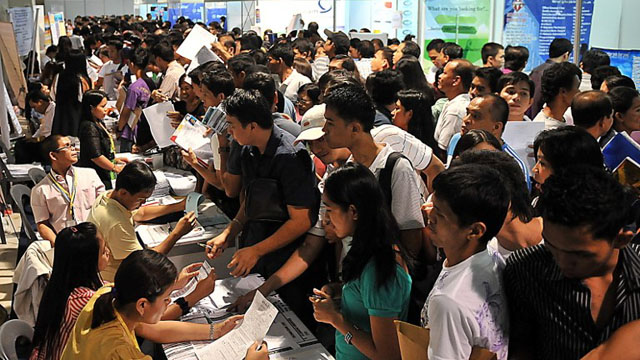SUMMARY
This is AI generated summarization, which may have errors. For context, always refer to the full article.

MANILA, Philippines – Despite the high economic growth of 6.6% in 2012, Filipinos are less optimistic there will be jobs for them in 2013.
In a survey conducted by the Social Weather Stations (SWS) in December, outlook on the availability of jobs in the next 12 months, while still “fair,” scored +10, down 7 points from +17 in August.
This came as the percentage of respondents who were optimistic about job prospects barely moved, while the percentage of those who were pessimistic increased.
“Optimism that there will be more jobs barely moved from 33% in August 2012 to 32% in December, while pessimism that there will be fewer jobs rose from 16% to 22%,” the SWS said.
A score of +30 and above shows “very high” optimism; +20 to +29, “high;” +10 to +19, “fair;” +1 to +9, “mediocre;” -9 to zero, “low;” and -10 down, “very low.”
In March 2010, the job outlook was fair at +18, and high at +26 in June 2010. In November the same year, the outlook was very high at +36.
Adult joblessness
The survey however showed joblessness among adults fell to 24.6% in December 2012 (equivalent to 10.1 million), from 29.4% (11.7 million) in August.
This meant that around 24.6% of the adult population had no jobs. The SWS said joblessness has been above 20% for the past 7 years.
“Adult joblessness is customarily dominated by those who voluntarily left their old jobs, and those who lost their jobs through economic circumstances beyond their control,” the SWS explained.
Of the unemployed, 11% quit, 10% were retrenched and 3% were first-time job seekers.
The respondents were jobless for the following reasons:
- They said they were tired and no work was available;
- They were waiting for results of job applications;
- They suffered a temporary illness or disability;
- They were waiting for rehires or job recalls;
- They were too young or too old to work;
- They retired;
- They suffered a permanent disability;
- They had to attend to household or family duties;
- They had to go to school.
The SWS joblessness survey is consistent with the traditional definition of joblessness: without a job or currently looking for a job. Those who are unemployed but are not looking for jobs are excluded from the labor force. Among them are housewives, the retired, disabled, and students.
The SWS survey was conducted from December 8 to 11, 2012, using face-to-face interviews of 1,200 adults in Metro Manila and the rest of Luzon, Visayas, and Mindanao. – Cai Ordinario/Rappler.com
Add a comment
How does this make you feel?
There are no comments yet. Add your comment to start the conversation.